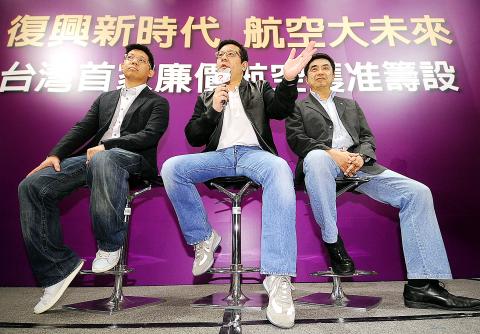TransAsia Airways Corp (TNA, 復興航空) yesterday said it would establish a low-cost carrier subsidiary within one year to meet rising demand.
The company, which mainly serves passengers on regional and cross-strait routes, said it planned to invest between NT$2 billion and NT$3 billion (between US$66.7 million and US$100 million) to operate the subsidiary.
To compete with the 12 foreign budget airlines already operating in Taiwan, TransAsia’s carrier is to capitalize on its locally based customer service to communicate directly with travelers.

Photo: Fang Pin-chao, Taipei Times
“This will be the only carrier that prioritizes Taiwanese demand and habits,” TransAsia chairman Vincent Lin (林明昇) told a press conference.
The new subsidiary is to target destinations that are within a five-hour flying range of Taiwan, Lin said, adding that the new carrier is to use Airbus SAS’ 320 and 321 series aircraft as its main fleet.
TransAsia received an official notification from the Civil Aeronautics Administration (CAA) earlier this week for the permission to set up the first low-cost carrier in Taiwan.
The company yesterday unveiled a month-long campaign inviting the public to name the new carrier, saying the winner is to be entitled to an exclusive offer of unlimited free TransAsia flights over the next 10 years.
Following the establishment of the new budget brand, Lin said TNA may also start a new round of transformation next year, aiming to provide more diversified options to passengers, with details to be released in the near future.
The company may either buy or lease up to three new airplanes for the airline’s operations next year, he added.
China Airlines Ltd (CAL, 中華航空), the nation’s largest carrier, is reportedly also mulling a new budget airline, with the final assessment to be finalized by the end of the year.

SEEKING CLARITY: Washington should not adopt measures that create uncertainties for ‘existing semiconductor investments,’ TSMC said referring to its US$165 billion in the US Taiwan Semiconductor Manufacturing Co (TSMC, 台積電) told the US that any future tariffs on Taiwanese semiconductors could reduce demand for chips and derail its pledge to increase its investment in Arizona. “New import restrictions could jeopardize current US leadership in the competitive technology industry and create uncertainties for many committed semiconductor capital projects in the US, including TSMC Arizona’s significant investment plan in Phoenix,” the chipmaker wrote in a letter to the US Department of Commerce. TSMC issued the warning in response to a solicitation for comments by the department on a possible tariff on semiconductor imports by US President Donald Trump’s

The government has launched a three-pronged strategy to attract local and international talent, aiming to position Taiwan as a new global hub following Nvidia Corp’s announcement that it has chosen Taipei as the site of its Taiwan headquarters. Nvidia cofounder and CEO Jensen Huang (黃仁勳) on Monday last week announced during his keynote speech at the Computex trade show in Taipei that the Nvidia Constellation, the company’s planned Taiwan headquarters, would be located in the Beitou-Shilin Technology Park (北投士林科技園區) in Taipei. Huang’s decision to establish a base in Taiwan is “primarily due to Taiwan’s talent pool and its strength in the semiconductor

Industrial production expanded 22.31 percent annually last month to 107.51, as increases in demand for high-performance computing (HPC) and artificial intelligence (AI) applications drove demand for locally-made chips and components. The manufacturing production index climbed 23.68 percent year-on-year to 108.37, marking the 14th consecutive month of increase, the Ministry of Economic Affairs said. In the first four months of this year, industrial and manufacturing production indices expanded 14.31 percent and 15.22 percent year-on-year, ministry data showed. The growth momentum is to extend into this month, with the manufacturing production index expected to rise between 11 percent and 15.1 percent annually, Department of Statistics

An earnings report from semiconductor giant and artificial intelligence (AI) bellwether Nvidia Corp takes center stage for Wall Street this week, as stocks hit a speed bump of worries over US federal deficits driving up Treasury yields. US equities pulled back last week after a torrid rally, as investors turned their attention to tax and spending legislation poised to swell the US government’s US$36 trillion in debt. Long-dated US Treasury yields rose amid the fiscal worries, with the 30-year yield topping 5 percent and hitting its highest level since late 2023. Stocks were dealt another blow on Friday when US President Donald